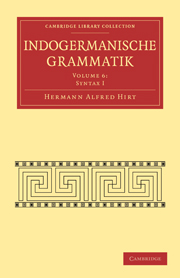Summary
Vorbemerkungen. An und für sich ist das Verbum kein notwendiger Bestandteil der Sprache. Wundt, Völkerpsych. 1, 2, S. 133 hat betont, daß viele hochentwickelte Sprachen ein Verbum in unsrem Sinne nicht kennen. Auch ich nehme an, daß sich im Idg. das Verbum gleichfalls erst entwickelt hat. Dafür kann man schon das Lateinische und Griechische anführen; denn in hohem Maße wird mehr noch in diesem als in jenem vieles nominal, d. h. durch Partizipien und Infinitive, ausgedrückt, wofür wir das Verb gebrauchen.
Man nehme nur einen Satz wie: ἀδικεῖ Σωκράτης οὓς μὲν ἡ πóλις νομíζει ϑεοὺς οὐ νομíζων, ἓτερα δὲ καινὰ δαιμόνια είςφέρων ‘S. tut Unrecht durch Nichtglauben an die Götter und Einführung anderer Gottheiten’; ἀδικεȋ δὲ καì τος νέους διαφϑείρων ‘er tut auch Unrecht durch Verderben der Jugend’. Oder lat. hac re statim Caesar per speculatores cognita insidias veritus, … exercitum castris continuity oder BG. 1, 40 Ariovistum se consule populi Romani amicitiam appetisse … Sibi quidem persuaderi cognitis suis postulatis,… eum neque suam neque populi Romani gratiam repudiaturum.
Der letzte Satz ist rein nominal, und derartige Sätze gibt es in großer Menge. Indessen hatte sich schon in idg. Zeit das Verbum finitum entwickelt.
Die Eigentümlichkeiten des Verbums sind:
1. Die Personalendungen, durch die drei Personen unterschieden werden.)
2. Die Bezeichnung des Numerus hat das Verb mit dem Nomen gemein. Doch ist diese eine andere als beim Nomen.
- Type
- Chapter
- Information
- Indogermanische Grammatik , pp. 177 - 181Publisher: Cambridge University PressPrint publication year: 2009First published in: 1934



